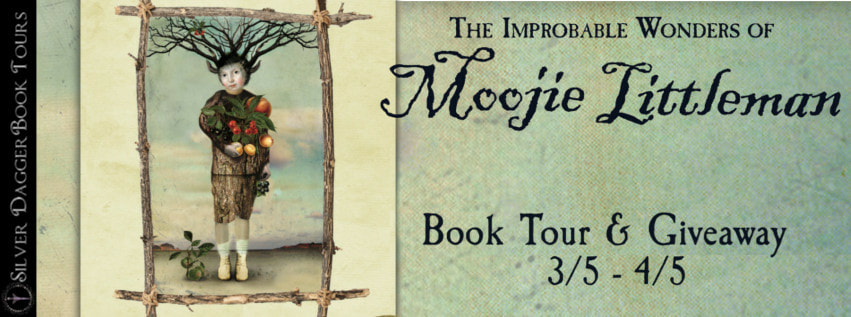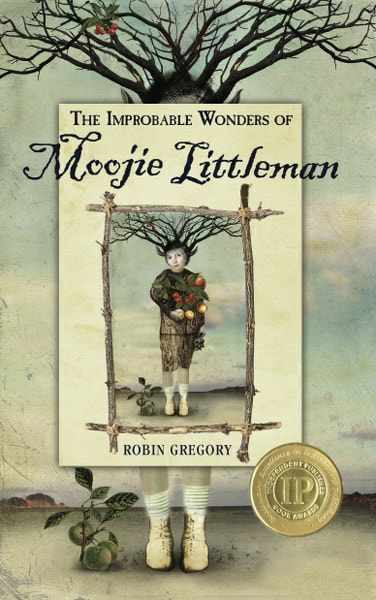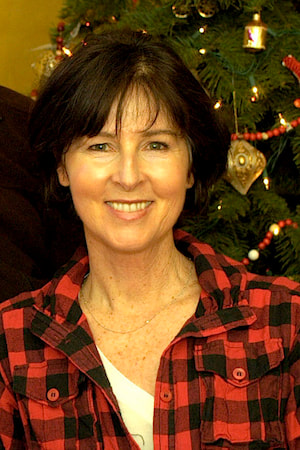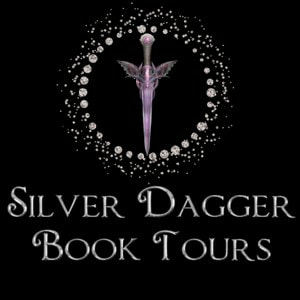and uncontrolled mystical powers, Moojie is taken by his father to
his grandfather’s wilderness farm. There, Moojie meets an
otherworldly clan of outcasts that he wants to join. Following a
series of misadventures–magical and mystical–he is summoned by the
call to a great destiny … if only he can survive one last terrifying trial.
Moojie Littleman is being lauded as a classic. A haunting, visionary
tale spun in the magical realist tradition of Gabriel Garcia
Marquez’s One Hundred Years of Solitude and Madeleine L’Engle’s A
Wrinkle in Time, the profoundly unique voice and heart-stirring
narrative recall great works of fiction that explore the universal desire to belong.
teachings. Born in Pensacola, Florida, she grew up in California,
accompanied by seven siblings, and surrounded by horses, real
cowboys, and the occasional rattlesnake. She has always been drawn to
helping others, a trait that began, to her mother’s horror, with
bringing home swallow chicks stricken from their nests. She has
worked as a journalist, lay minister, and infant massage instructor
for mothers and babies at risk. Her studies include Literature and
Creative Writing at University of California, Santa Cruz and Stanford
University’s Writer’s Workshop. She lives with her husband and
son in a Carmel cottage old enough to make you sneeze. “The
Improbable Wonders of Moojie Littleman” is her first published novel.
for exclusive excerpts, guest posts and a giveaway!
GUEST POST
A Life of Magical Realism: My Novel to Film Adventure
Not everybody likes award-winning movies. Guillermo del Toro’s The Shape of Water won four
Oscars: best picture, best director, best original score, and best production design, but some
critics called it pedantic, shallow, unoriginal, and manipulative. It is no surprise that a film that
plunges into stark contrasts is also eliciting polarized reviews. Controversy seems to badger
great works. The novel of the same title, co-authored by del Toro and Daniel Kraus, hasn’t won
nearly the same acclaim as the film. But here’s why I’m happy: magical realism has finally found
a toehold in mainstream America. If the Academy of Motion Picture Arts and Sciences has a
finger on the national pulse, it seems America is ready for stories that treat supernatural and
mythic themes as a natural part of life.
I’ve been drawn to mysticism and spirituality most of my adult life. During this time, I’ve
witnessed a number of healings (my own and others’)—from the common cold to terminal
cancer—without the aid of medical science. So-called miracles have become a natural part of
my life. As a writer, I am excited to build stories on this premise. With a little help from Charles
Dickens, I follow a tradition of subverting expectations and use irony to call into question social
and religious traditions. For example, in The Improbable Wonders of Moojie Littleman, I address
Pappy’s bigotry in a historic (and personal) context while showing him also as protective of biracial,
disabled, troublesome Moojie. On the other hand, Moojie, who is developmentally
challenged, is often wiser than Pappy and the adults around him. Another example can be found
in The Whale Rider. Paikea, the protagonist, is excluded from her grandfather’s search for the
next tribal chief because she is a girl, but she is more capable than any of his male candidates.
My greatest wish as a writer is to create stories that show characters subverting human
expectations by awakening to their divine nature. For the past year I’ve been working on the film
adaptation of Moojie Littleman, Book 1. Adaptation and screenwriting are completely different
from novel writing so there are a number of changes to the story, but the basic themes and
premise remain true to the book. My mentor, John Crye—writer, actor, producer, editor, and
former CEO of Newmarket Films (produced The Whale Rider)—is as excited about magical
realism as I am. While my screenplay is still in development, I credit John’s magnificent
oversight for this pre-production review:
“The Improbable Wonders of Moojie Littleman” is an emotionally powerful and viscerally
stunning fantasy with a fascinating and hard-hitting family drama not overshadowed by all the
spectacle. We are, with Moojie, entering a strange new world here where the incredible seems
possible. At the heart of the story is always his quest for belonging, a universal human drive that
resonates even in such extraordinary circumstances. The Light-Eaters are intriguing and
capable of holding our interest with both their capabilities and thematic nature. Nahzi is a
particularly breathtaking and memorable element. They are inspirational as well, and we can
see that it is Moojie’s time with them that helps him mature in the way that he does, whether it is
taking responsibility for starting the trouble, or telling Babylonia he loves her with the stirring
speech, “The day I met you, it was like I fell asleep and woke up in a better world.”—THE
BLACK LIST, Hollywood (Aug/2018)
Europe, Australia, and South America have long-embraced magical realism in art, literature, and
film. It is thrilling to see it finally recognized in America. Thanks to David Lynch’s legacy, and
other commercially successful films, like Being John Malkovich, Donnie Darko, and Edward
Scissorhands, the road has been paved for stories that normalize mythical, spiritual, and
mystical experiences. If you are drawn to films like this, you’re going to love the Moojie film!
Here are some magical realist films worth seeing: The Whale Rider, Beasts of the Southern
Wild, Amélie, Micmacs, The Delicatessen, The Navigator: A Medieval Odyssey, and Pan’s
Labyrinth.
So it’s onward and upward! Time to get back to work. Just finishing the fifth revision of the
screenplay. Two more books in the works will complete a Moojie Littleman trilogy. I love hearing
from you. Whether you are parenting or writing or being the CEO of a national corporation, I
want to hear how you are following your dreams!








